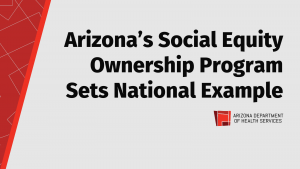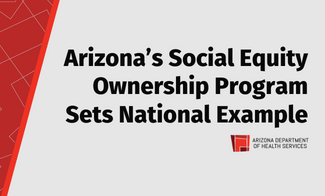 Recently, 26 licenses were awarded under the Social Equity Ownership Program required by the voter-approved Proposition 207, which legalized adult-use marijuana in Arizona.
Recently, 26 licenses were awarded under the Social Equity Ownership Program required by the voter-approved Proposition 207, which legalized adult-use marijuana in Arizona.
Lasting less than three minutes, this live-streamed digital drawing might have made the process look easy. In fact, a great deal of thought and effort went into creating a successful program on the tight timeline required by law.
I consider Arizona’s Social Equity Ownership Program a model among states that have created them. For one thing, I’m aware of no other state that has been able to award social equity licenses without being delayed by legal challenges.
The ADHS Bureau of Special Licensing, which includes licensing of marijuana establishments, deserves much of the credit, of course. It oversaw the process of determining who should be eligible for the social equity ownership program. According to the law, awarding social equity licenses should promote the ownership and operation of establishments by individuals from communities disproportionately impacted by enforcement of previous marijuana laws.
The Bureau of Special Licensing also organized training sessions required for prospective applicants. Offered by industry experts, this live and pre-recorded online training program offered one-on-one support and clinics to help potential licensees navigate the application process and get their questions answered. More than 2,700 people completed this training.
The program drew more than 1,500 applications, and the Bureau of Special Licensing reviewed each one so that the drawing could be held according to the deadline established in the voter-approved law.
But this complex effort required heavy lifting by others within ADHS – and during a global pandemic, no less.
The ADHS Office of Health Equity was tasked with establishing a program required under the new law to help individuals who may be eligible to petition for expungement of marijuana arrest or conviction records. It distributed a grant to the Arizona Justice Project, has joined forces with legal services partners to hold public education events and free legal clinics throughout Arizona. They provide legal guidance for determining eligibility for expungement, help individuals prepare petitions for expungement, and offer pro bono legal representation.
The ADHS Office of Administrative Counsel and Rules created rules, with stakeholder input, on how the program would be run. This was no small task in the time required.
All of this culminated in a drawing that awarded the 26 social equity licenses available under the law, capping months of concentrated effort by ADHS.
However you feel about adult-use marijuana, I hope you will appreciate the effort behind this successful launch. I’m proud of what ADHS staff have done to carry out the will of voters since Proposition 207 passed in November 2020.










